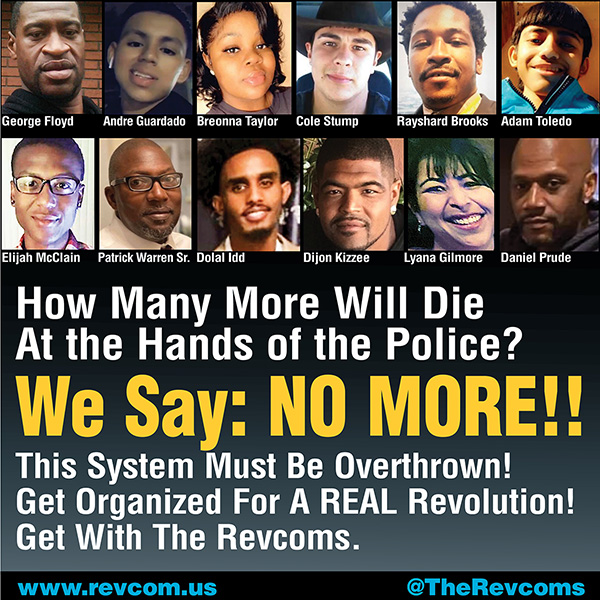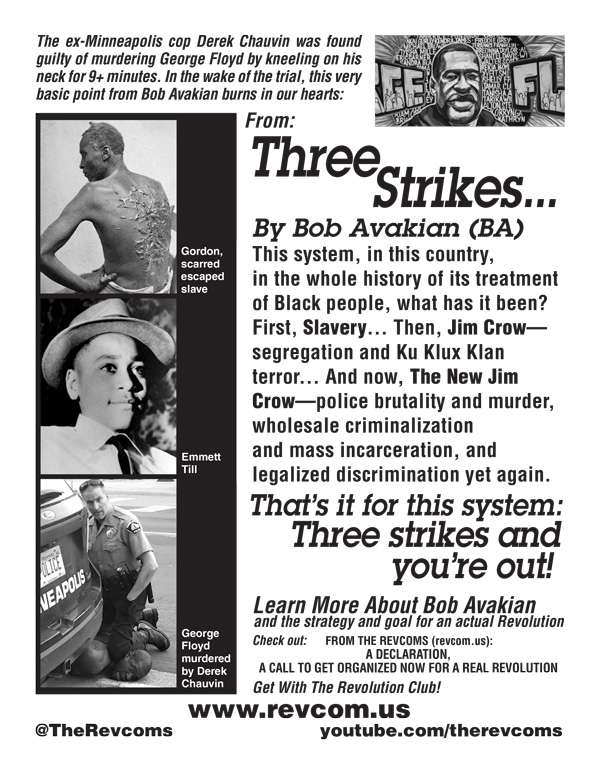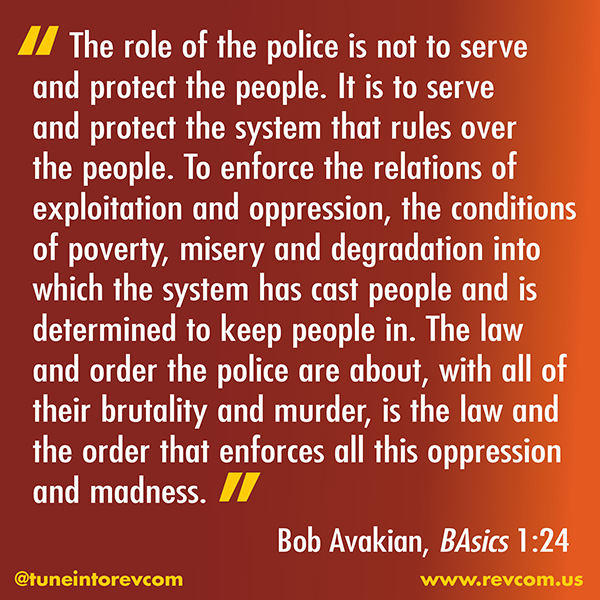Derek Chauvin’s Murder of George Floyd:
“Another link in the long chain of horrendous crimes of this system.”
| revcom.us
Week Two of the Trial of Derek Chauvin
Expert Witnesses Confirm What the World Saw on Video: Chauvin Murdered George Floyd
The first week of testimony painted a devastating picture of a crime—the cruel murder of George Floyd at the hands of police—through the eyes of bystanders who witnessed it. And it brought out Floyd’s humanity, especially through the testimony of his girlfriend, Courteney Ross.
The second week focused on expert testimony on two issues: whether police use of force against Floyd was legal under Minnesota law, and whether this force was the cause of Floyd’s death. Police in the U.S. have a mandate from the authorities to exercise brutal force—including deadly force—on a routine basis, and the legal system almost always backs them up.1,2 In that context, this week’s testimony will likely have a big impact on the outcome of the trial.
Police Use of Force:
Was the police use of force against Floyd allowable under MPD policy?
Derek Chauvin and two other cops held George Floyd face down on the pavement, hands cuffed tightly behind his back, with Chauvin’s left knee on his neck and another cop on his back, for 9 minutes 29 seconds. This fact is largely undisputed.3 But Chauvin’s attorney, Eric Nelson, is arguing that this use of force is legal under MPD rules.
Ten police witnesses testified for the prosecution about this. MPD Chief Medaria Arradondo said once Floyd “stopped resisting and certainly once he was in distress and trying to verbalize that, ... and was no longer responsive, and even motionless, to continue to apply that level of force to a person proned out, handcuffed behind their back, that, that in no way, shape or form is anything that is by policy, it is not part of our training.”
This was backed up by other witnesses, including Sergeant Jody Stiger, a use-of-force expert with the notoriously brutal Los Angeles Police Department: “He was in the prone position, he was handcuffed, he was not attempting to resist, he was not attempting to assault the officers—kick, punch or anything of that nature.”
Nelson pushed back by pointing out that MPD rules do allow cops to brutalize people like this for periods of time, and that all MPD rules allow “officers on the scene” to use their discretion as to how to apply the rules, depending on the situation. The prosecution’s witnesses mainly did not dispute this overall, but held to the position that in this case, it went on too long, and that after Floyd was unconscious it was no longer authorized.
Were police required to provide emergency medical aid once Floyd became nonresponsive?
All police are trained in cardiopulmonary resuscitation (CPR), and Chief Arradondo testified that “the defendant violated our policy in terms of rendering aid” in emergency situations. Nelson claimed that this requirement didn’t apply because the cops had called an ambulance, but other witnesses said the policy was clear that aid must be provided while waiting for the ambulance. (Paramedics reported Floyd was dead when they arrived.)
Nelson also argued that the “loud, excited” and “hostile” group of bystanders protesting Floyd’s murder prevented the cops from providing CPR. He got some support on this from the MPD officer who trains police in medical care; she said that such a crowd makes care “incredibly difficult.” But Sgt. Stiger pointed out what is obvious on the video—the so-called “hostile crowd” is actually a dozen “concerned” people—including four children and an older man—who did not threaten the cops. Likewise, the defense argument that the situation was so “chaotic” that the cops didn’t realize Floyd needed aid disintegrates in the face of the fact that the police themselves took Floyd’s pulse, found he didn’t have one, and continued to brutalize him.
Did George Floyd Die as a Result of Police Force?
This was addressed by several highly experienced medical professionals. World-renowned pulmonologist4 and critical care physician5 Dr. Martin Tobin walked the jury through the video, pointing out all the indicators that Floyd was being deprived of oxygen and how that killed him. Tobin pointed to Floyd struggling to free up his lungs from the suffocating pressure, fighting for air, gradually losing consciousness, and even the point at which he passed away. He refuted the cops’ claim that “If he can talk, he can breathe,” pointing out that people can talk until they are at the very brink of suffocation death.
The former chief of the Minnesota Regional Medical Examiner’s Office, forensic pathologist6 Dr. Lindsey Thomas, testified along similar lines. And (like Tobin) she also point-by-point refuted defense arguments that Floyd had died of a pre-existing heart condition, or of a drug overdose. These experts pointed out that an overdose of opioids is a “peaceful” and rapid death—victims fall asleep, go into a coma and die.
Dr. William Smock, the surgeon and at-the-crime-scene doctor for the Louisville, Kentucky, police department, put it this way: “He’s breathing. He’s talking. He’s not snoring. He is saying, ‘Please, please get off of me. I want to breathe. I can’t breathe.’ That is not a fentanyl overdose. That is somebody begging to breathe.”
As Dr. Thomas said “There’s no evidence to suggest [George Floyd] would have died that night except for the interactions with law enforcement.”
The last witness was Dr. Andrew Baker, Chief Medical Examiner for Hennepin County, who performed the autopsy on Floyd. That autopsy labeled Floyd’s death a homicide (which in medical terms means “death at the hands of another”—i.e., the police.) And in a confusing way it did say that police “subdual, restraint and neck compression” killed Floyd. But the report also raised drug use and other health issues as “contributing factors.” As a whole it did not make clear that police force caused Floyd’s death.7
When asked direct questions by the prosecutor, Baker did clarify this somewhat—reaffirming that Floyd’s death was a homicide, and saying straight up that neither heart disease nor drugs was “the direct cause” of his death, and that police force was the trigger to his death. But he also continued to fudge these questions whenever he could, saying things like “the law enforcement, subdual restraint and the neck compression was just more than Mr. Floyd could take by virtue of those heart conditions.” [emphasis added] His testimony left some openings that the defense is likely to exploit when they present their case next week.
Conclusion:
The week’s testimony presented a very strong argument for the fact that Chauvin’s actions were illegal and caused George Floyd’s death. But testimony from those witnesses who are themselves part of the law enforcement apparatus also provided openings for the defense to attack when it presents its case next week. And as noted earlier, the scales in cases of police murder are tilted very heavily towards the police.
1. Out of roughly 15,000 police killings since 2005, 121 cops have been charged with manslaughter or murder. Of these, 44 were convicted, often on lesser charges. (New York Times, September 24, 2020). [back]
2. See “AdvantageCops! in the Injustice System of these United States.” [back]
3. Chauvin’s attorney has tried to make hay out of the fact that at a few points, Chauvin’s knee moved from neck to shoulder for a few seconds, but this in practice is a trivial point. [back]
4. A doctor specializing in the lungs and respiratory system. [back]
5. An intensive care unit doctor. [back]
6. A forensic pathologist is a doctor who performs autopsies to determine the cause of death. [back]
7. Baker also noted that no drugs were found in Floyd’s stomach, undercutting a major defense argument that Floyd died as a result of swallowing a large quantity of drugs when confronted by the police. [back]

FROM THE REVCOMS (REVCOM.US):
A DECLARATION,
A CALL TO GET ORGANIZED NOW
FOR A REAL REVOLUTION
Read this Declaration and Call, find out more:
Basic version |
Extended version
Available in Brochure format (PDF):
Basic version |
Extended version


Get a free email subscription to revcom.us:




The entire world watched—and rose up against—the brutal, slow-motion murder of George Floyd by a Minneapolis pig, Derek Chauvin, through a horrific nine-and-a-half minutes of torture. More: as this uprising went on, people raised big questions about the whole history and nature of this country—with its system born in the genocide of the Native peoples who lived here and the kidnapping and enslavement of millions of African human beings. People went up against repression and brutality from those same enforcers of that system, and dragged into the light of day many other police murders of Black and Brown people, and the whole matrix of mass incarceration and daily police terror and repression against those peoples.
Now there is a trial. And because the world rose up—and only because the world rose up—so far there has been a real case made against this murderer, with witness after witness testifying to the horror and needlessness of what was done to George Floyd. What has also been allowed to come through so far has been the humanity of George Floyd and those who gathered to stop this modern-day lynching—and the inhumanity of those pigs. They ignored or mocked the bystanders who pleaded for his life while Chauvin slowly suffocated him to death. Our coverage from the trial in these past weeks (here and here) brings this out fully.
All this is very clear. And there is no legitimate basis for “complicating” and distorting what happened. Anything but a conviction in line with the seriousness of the murder would be an additional outrage.
And we cannot lose sight of the fact that, even with a conviction of a serious charge in this case, the horrific nine-and-a-half minutes of torture and utterly unjust death perpetrated against George Floyd is yet another link in the continuing long chain of horrendous crimes of this system. And these crimes can only be ended by putting an end to this very system itself—through REVOLUTION, nothing less.